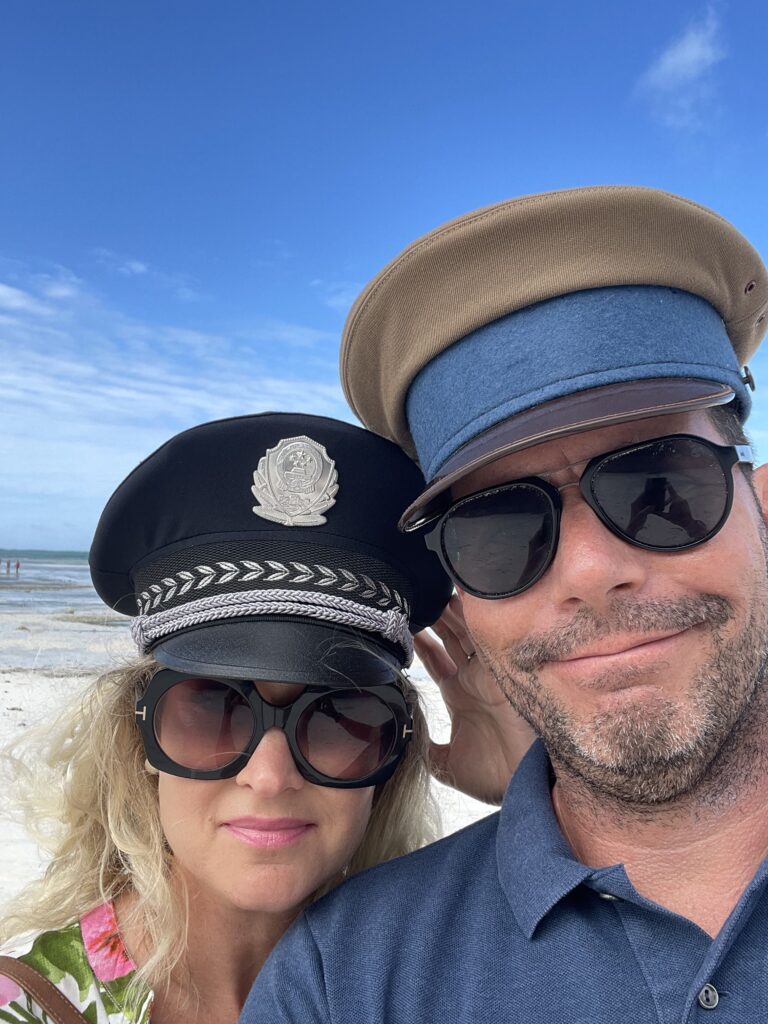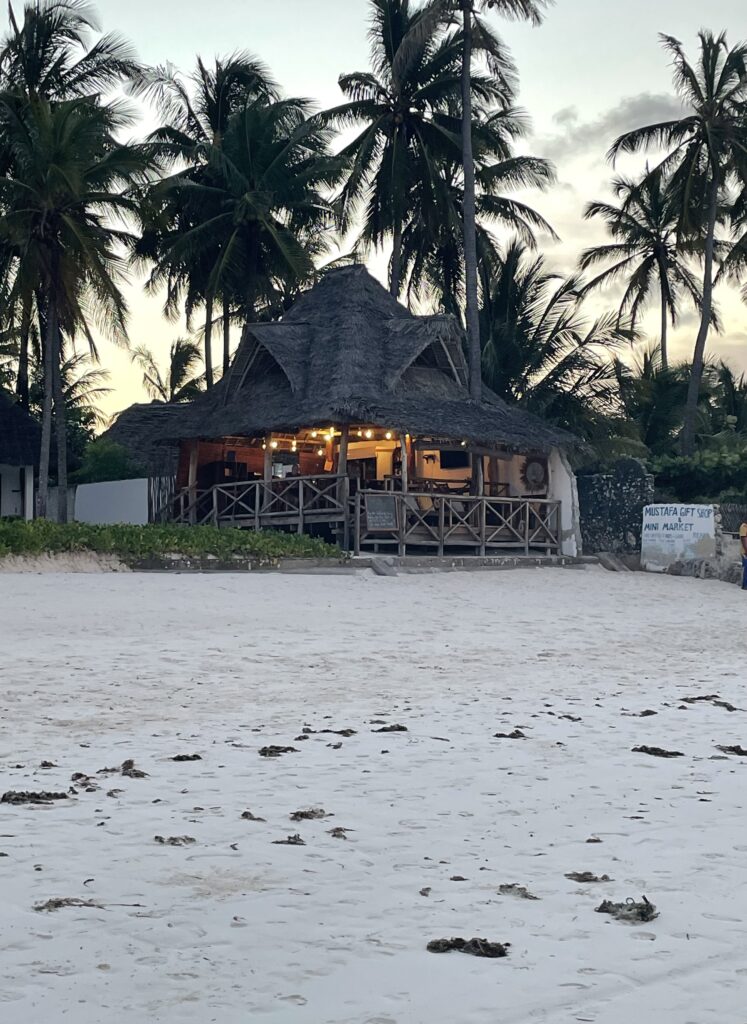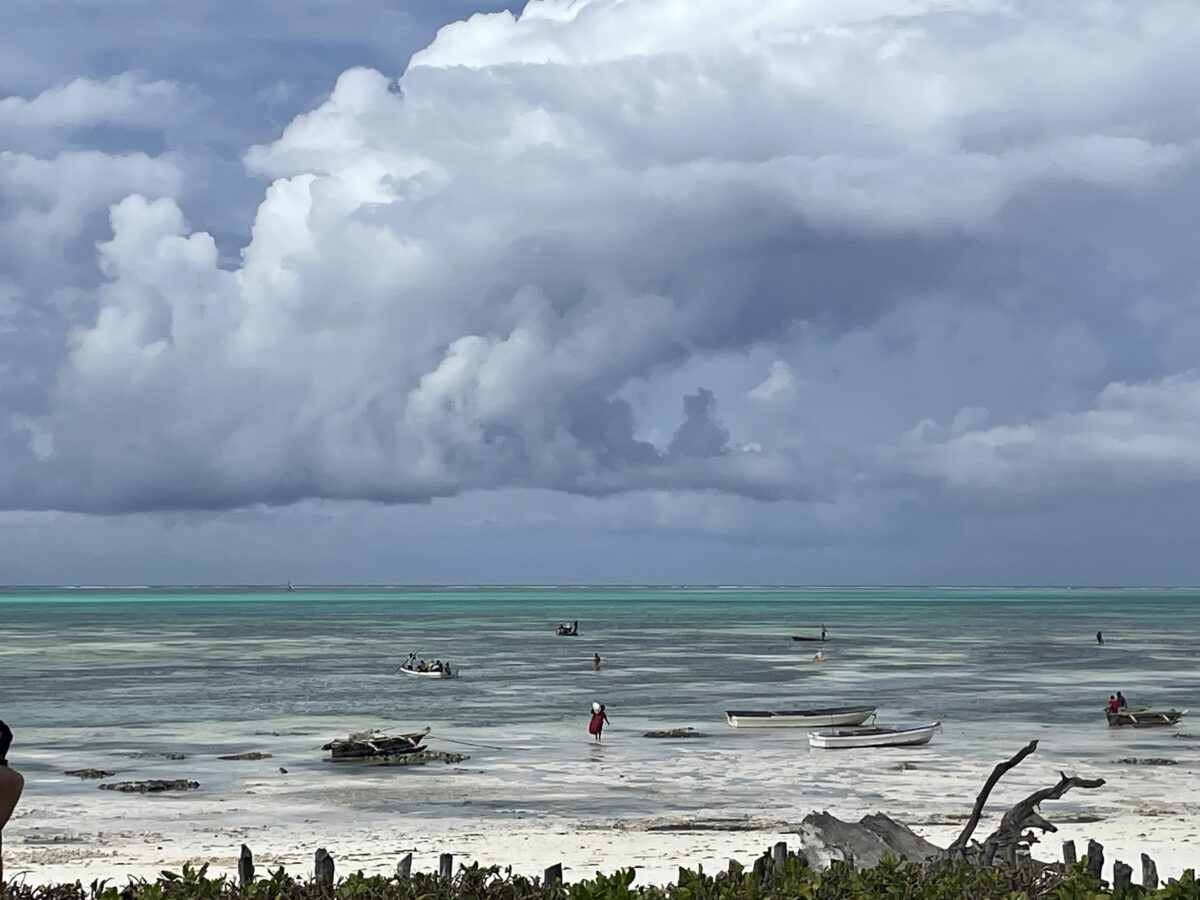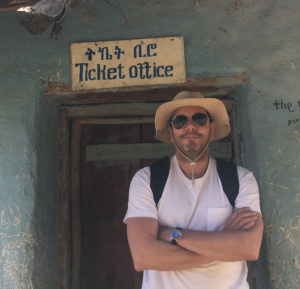We were supposed to be married more than two years ago on the Bosphorus. But Covid-19 put a stop to that, and we are still unwed. Crazed by what seems like decades of lockdown and no travel, we are going on an enforced honeymoon, possibly the first of several, because the hotel cannot postpone the booking for another year, and Zanzibar is (fortunately) one of the only places we can travel to from South Africa.
We are desperate with boredom. It is possible that (with exception of refugees fleeing a bloody coup) nobody has ever been so excited to be on a plane.
For reasons not entirely clear to me, while in the middle of a last-minute project that involved what is probably some kind of professional misconduct, I bought us a pair of Bulgarian army officer’s hats from a costume store, and we are travelling with them. Because you never know.
I had no idea that my breath smelled like this until I started having to wear face masks every day for the last what seems like a decade. Medical attention of some kind may be required.

Covid-19 has led to a glorious flowering of bureaucracy. There are several men in bright vests whose job is to energetically point in various directions. They are sternly joyful at this new authority.
I prudently transferred money into my credit cards so we don’t repeat the Istanbul “no money and partial abduction” situation or the Ethiopia “lost my only credit card, stuck there” dilemma. I’m hoping that Fiancée and her admin skills will make this trip less chaotic, perhaps at the price of the unwanted attention that her appearance seems to invite in places like the more burkha-ish areas of Turkey.
I’ve also decided that from now on I will always travel with crystal glasses. They’re in my new suitcase next to the Bulgarian officers caps, the three bottles of gin, several backgammon sets, a dozen rather intriguing women’s swimsuits, two books on medieval theology and the benzodiazepines.
The plane seems more crowded than ever. The smells in economy class are so multifaceted that one is grateful wearing a face mask is compulsory.
The Air Kenya air hostesses are dressed in face masks, weird hospital hair nets and funny serial killer/surgical nurse white ankle-length rubberised gowns, and look like they’re Hannibal Lecter’s American Psycho murderer sidekicks. Am pretty sure they have cable ties, bleach and a hacksaw hidden in the cockpit.
This is probably going to be our best honeymoon ever.
The car from the airport flies along the pitch-dark pot-holed road. Mango trees the size of ancient oaks rocket past. The indicator is on constantly, but seems wholly unrelated to turning or anything directional in nature. Boldly, we overtake a minibus that is itself overtaking a posse of bicycles.
The suspension is so worn that the driver slows from high speed to crawl at various points, and gently eases over speed bumps that he knows by heart, like a fisherman knows the reefs.
The approach to the hotel takes us through what is clearly a slum of some kind. I can sense Fiancée tensing. She has booked and paid for the trip. The slum is not a promising sign. I try to make calming noises. With minimal success.
We enter the hotel, and it is clearly delightful. She swivels to check if I’ll be happy with the sea view. I make further calming noises, because there is no sea. There is only sand and mud flats stretching away towards the horizon. It is strewn with various boats and fishing craft. D-Day on the day after the assault on the German defences. But with less burnt-out tanks. Quite confusing.
The next morning, we wake up early. After an unusually heavy tide, the sea has come in, and the beauty of the beach in front of us is like a punch in the face. Ludicrous. Hard to describe at all without use of the clichés that I have undertaken not to use. There are only really two colours. The white of the sand is utterly white, the turquoise of the sea so vivid that it looks like a badly retouched photo. Madness.
Slightly anaesthetised by the beauty, we lurch towards the open air restaurant area.
Breakfast is fruit from the market we passed on the way here. The colours are ridiculous. The bananas are tiny — the size of cocktail sausages — and taste like what I imagine bananas tasted like before supermarkets, refrigerated trucks and cling film got involved.
A Ukrainian couple sits at the next table. We are fascinated by her enormous eyelash extensions. Like the eyelashes on a Disney gazelle.
The iridescent beauty of white sand and glare of the sun on the tidal flats make one wince a little.
Sun-baked dhows are scattered along the beach.
Stimuli changed. Triggers escaped. Suddenly. The peace (passing all understanding) which lies somewhere inside us, is abruptly released, like a prisoner whose release has (eventually) come.
We spend the day wandering vaguely along the beach. Having so recently fled winter, lockdown and the Covid-19 wrath of God, we are slightly stupefied.
The next day we venture further up the beach, and come across a wonderful bar which attracts our attention with a sign offering a free cocktail to anyone who fills up a bucket with plastic they find on the beach. They seem exactly like our kind of people, though we have no intention of doing any work to earn our drinks. The bar has a wall decorated with shoes that from time to time wash ashore, from India, Sri Lanka, Borneo, the Comoros and Maldives. It is cleverly named The Bar of Lost Soles, and is staffed by Vanessa and Mark — delightful refugees from the corporate world who have sensibly fled to this island.
Sitting at their bar, playing backgammon as the shadows soften and the warm evening arrives, I struggle to understand why I don’t do the same.
Why on earth would one choose not to live in a place like this? Admittedly one would earn less: the great sin in a society that teaches us to sacrifice all our dreams and needs for money, cars, houses, things, status, more things.
“The world is too much with us; late and soon,
Getting and spending we lay waste our powers” (William Wordsworth).
“The true cost of a thing is the amount of life you exchange for it” (Henry David Thoreau).
Work-from-home was something that I resisted manfully, starved of interactions and people, wildly raving while confined to my house. But could it not become work-from-anywhere? Like The Lost Soles Bar? The Garden Bungalow Lodge? Or the sun lounger next to the pool? How much life am I exchanging for the things I have? The things I buy? The things I will buy?
We walk back to our hotel in the dark, suspended in time. Everything is varying shades of purple now, and the sea has retreated back across the tidal flats, leaving the dhows lying at awkward angles on the sand. The cool, neat, fretted skyline is soft now. The air delicate with distant chatter. The cool, ancient island reduced to dark silent shapes. An understanding breeze mutters incomprehensible truths. A strange bird calling. Trees cluster along the edge of the beach. Azalea. Oleander. Mangrove. Mimosa. Lianas. Hibiscus. Nutmeg. Cinnamon. Something apparently called Jackfruit.
The next day is spent doing very little. Apart from reading and eating those small bananas.
Clouds pile up above the (turquoise) sea. Great fragile cathedrals. Fierce-edged. Trumpet-bright. Arsoned by the sunset.
From time to time, we see people flying along the beach on scooters. This seems like something one needs to do. Consequently a scooter is rented. But, when it arrives at the hotel it becomes clear that it possesses an enormous engine. It’s more of a large motorbike, but with the lady vibe of a scooter. As soon as I start it up, I realise this is potential trouble. Fiancée gently asks me if I’m sure I know what I’m doing. I confidently reply that I do (it’s important to appear competent in front of fiancées) and then set off. The scooter shoots wildly forward into a pile of sharp coral rocks. Bleeding, I get up and attempt to appear in control, and like I know what I’m doing. The small amount of blood on my forehead admittedly doesn’t help this.
But after the initial incident, things improve and a scooter ride is had.
Later, as we walk under the big, fat bougainvillaea and leave the hotel, Fiancée notices children running and playing on the beach. Caught up in memories of rural childhood in Zimbabwe and Mozambique, she enthuses about how this is the way children should grow up. Running free, lots of unsupervised play.
Because I am somewhat of a first world cynic, I reply that it doesn’t look very safe. She is justifiably irritated by this unromantic comment.
We walk along the indecently beautiful beaches below the hotel. Any attempt to fully describe the whiteness of the sand and the turquoise of the sea indicates why photography was invented — there are some things that can’t be described, only seen. The beauty is almost a burden, gigantic and endless. Completely overwhelming. If Instagram was a place, it would be this beach.
We lie in the warm turquoise water, unsure of what to do or say in such a place.
On the way back, we pass another perfect beach bar thatched with palm leaves as the sun lowers and the palm trees rattle softly.
Reaching the hotel, we notice a small group of people talking and gesticulating. It is clear that something is wrong. We discover that one of the children we saw playing earlier has drowned.
It’s almost incomprehensible.
Did my earlier comment somehow make this happen? How could something like that happen in a place like this? How could horror and perfection exist so simultaneously?
Quiet now. We return to our room.
The next day I return to the perfect swing-chair overlooking the beach. It hangs from a gnarled little pine tree that has been tortured by decades of coastal wind into the perfect shape for a swing-chair. The beach is silent and beautiful. White. Delicate.
Saddened by the previous day’s event, we take the scooter up the beach. Fishing dhows flash past. The beach is endless. Turquoise, turquoise. White. Blue.
I find a cowrie shell. Two hundred years ago, Zanzibar traders took these into the interior and traded a good one for a slave. Far from the ocean, nobody had ever seen anything like these. A pearly Fabergé porcelain piece of perfection, worth a human life not that long ago.
A fisherman has lit a fire under a dhow dragged up onto the beach. I imagine he is burning his boat before setting off on a mythic quest. Although (more practically) he’s perhaps sealing the boat’s hull with tar or something?
Then a hotel. Built by one of the Eastern European chains on the island. It’s astonishing ugliness would be deeply striking anywhere. But here it is an obscenity. Cheap stainless steel. Lurid paint. Rooms cleverly constructed to be both hideous and have no view of the ocean right in front of them. An abomination. A wart on the face of God. An atrocity.
Fortunately my ranting about this hideousness dies out before it spoils things for us both. The scooter races along the hard sand just below the tidal line. We stop at a beach café and drink pomegranate juice.
The next day we take another obviously not roadworthy car to the capital city. A cheerful young man ferries us to the island facing the harbour. It is largely filled with a sanctuary for giant turtles. It would be untrue to say that it is a particularly beautiful turtle sanctuary, But they are here because they were (being tasty and not fleet of foot) hunted to the edge of extinction. The oldest one is a female that is 197 years old. Even her wrinkles are wrinkled. Her slow movements imply experience and some great knowledge. She was alive before the Scramble for Africa. When Europeans were only starting to use Zanzibar as a base for exploration into the interior to discover the source of the Nile. And it is possible that she will still outlive me. So much time. Such slow movements. I’m almost unbearably moved.
We drink cold beer and swim on the beach below.
Apparently things do not happen fast here. The Sultan’s Palace is still being rebuilt after being shelled by the Royal Navy more than a hundred years ago. We walk around it. Aware of her ability to unwittingly cause consternation in Moslem countries, Fiancée is swaddled from head to foot in a variety of sarongs, head scarves and wraps. Nobody wants a repeat of the Istanbul situation.
The palace was destroyed in what is officially the shortest war in history.
A foolish young sultan decided that he would prefer to fall under the “protection” of the Germans rather than the British, possibly because the Kaiser was less likely to interfere with the slave trade that the later British took a dim view of. The rebellion got off to an unpromising start when half of his army deserted to side with the British, and things went further downhill when a navy battleship bombarded his palace, levelling it in minutes. He surrendered after just over half-an-hour of fighting. History’s shortest war.
Behind the palace is the slavery museum. The trade in humans thrived here; since the 1400s, Arab traders emptied regions near the Great Lakes to supply the slave markets of the Arabian Peninsula. The chambers where they kept slaves en route to these markets are beyond comprehension. Carved from rock below the city. Only a sliver of light from a narrow slit window 10 centimetres wide cut into the stone. So much suffering. Surely this rock must have absorbed it to some extent over the centuries? Such agony. How did the trees and surrounding earth not rise up to intervene?
The cathedral next door was built on the site of the slave market when slavery was outlawed. Its stone floor is the same floor on which people from Buganda and the Congo stood as they were auctioned off. Rubbed smooth by centuries of bare feet. The bases of the wooden poles to which they were chained are still visible.
Horror once again alive in soft-edged paradise.
A sombre walk through the beautiful decay of Stone Town. Walls bulging. Streaked with mould. Skinny energetic dogs. Burkas. PSG football jerseys at street stalls. Curry being sold from cauldrons. Plastic Chinese goods for sale. Religious bookshops. Bicycles. Haggling. The stench of the meat market. The choking incense of the spice district. Shouting. Silence in the quiet, narrow, giant-ceilinged alleys. Exhaust. A cow eating an old falafel. A broken plastic chair. An ornate cast-iron Victorian drinking fountain, dry for 100 years. Dried fish being sold in bundles. Great piles of coconuts. Cracked paving stones, edges worn smooth. Sunset tours. Kebab stands. Seafood. Vote for the ZI Party. Bread, fruit for sale. School girls in headscarves. Gold bought here — best prices. Seagulls. A tiny mosque. A woman selling old coins. A Peugeot stuck between a cart and a statue from the 1800s. A mango tree. Belly dancing classes every Tuesday. Intricate rusty Omani-era bars on windows. Doors carved with symbols to show that slaves were once sold there in defiance of the law. Mildewed churches. Scaffolding. Empty bottles of Kilimanjaro beer. Lebanese hip-hop music. An undulating call to prayer.
It was probably a mistake to go on the dolphin and reef snorkelling trip. There were no dolphins of any kind and the greyish-white reef seemed (to my unbiological eye) close to death. But Ursula Andress and I enjoy gliding over the still-spectacular shapes. She looks much better in flippers than I do.
After the snorkelling we are taken for lunch at the top of the beach, where the sand ends and trees begin. The long table is next to a pile of rubbish and a rusted piece of corrugated iron. The seafood is morning-fresh, and endless. The wind warm.

That afternoon I retire to the swing chair to read. There is a specific sound that only a pine tree in a light breeze makes. It must have something to do with the air flowing over a hundred thousand pine needles in the branches above one. It is profoundly pleasant.
Sitting here above the while tidal flats and the small turquoise-streaked waves, it seems too easy to believe that goodness (and mercy) will follow me all the days of my life, and that I may dwell in the house of the Lord forever — probably with room service.
Fiancee sets off for one of her long walks on the beach. When she returns she is outraged. Luminous with anger.
An upsetting encounter with a “beach boy”. He cycled up next to her, keen on conversation, a meal and apparently some sex. When she asked him to leave, he refused, blocking her way with his bicycle. In a charming speech, he explained that he’d had sex with many women like her. That she wasn’t better than him. Terrified, she tried to walk on. He followed, shouting. Only when some kite surfers intervened eventually did he leave.
When we discuss the incident with the hotel manager, she sighs. “It’s the girls who come here from Greece and Russia, who are the problem,” she explains. “For some of them hooking up with a Masai is a bucket list thing. The moment they arrive, they are looking for one. Obviously it doesn’t take long. And equally obviously, almost none of them are actually Masai. And it always ends badly. The beach boys spend a couple of days with them, and then often rob them. It creates great problems for other women when they come to Zanzibar.”
It becomes clear that this situation is a toxic blend of religion, money and misogyny. The beach boys want sex and money from the foreign women. But they also despise them. No local woman would behave in such a way, and their religion teaches them that any woman who does is worthless and corrupt. So they are disgusted by the bikini-clad sex adventurers, but also bewitched by their money and promiscuity.
It is an unlovely side to the island.
Until that point, we had wondered why our hotel employed only women. Not any more.
Zebu cattle roam the beach. Old men on faded plastic chairs play an intricate boardgame on a carved wooden board that I will never understand.
Hotels, luxury villas and fishing shacks stand side-by-side on the beach. Luxury restaurants and home-cooked seafood places. Welcome to New Teddy’s Beach Bar. Kim & Mother beach restaurant — for a taste of yourself. The Feesherman Place.
I’m not sure that I have ever been so pleasantly bored as I became during our last few days in Zanzibar. My anxiety, slave to the getting and wanting, has been non-existent here. Perhaps something about the tropics makes one sure one could exist owning only some shorts and a few hats. It seems to be working for Vanessa and Mark since they fled civilization to run the Lost Soles Bar. I wonder. Maybe this is a way that I could find mine.
We leave, as we arrived, at night. The dark shapes of the island get smaller and smaller … until they disappear into the ocean.




